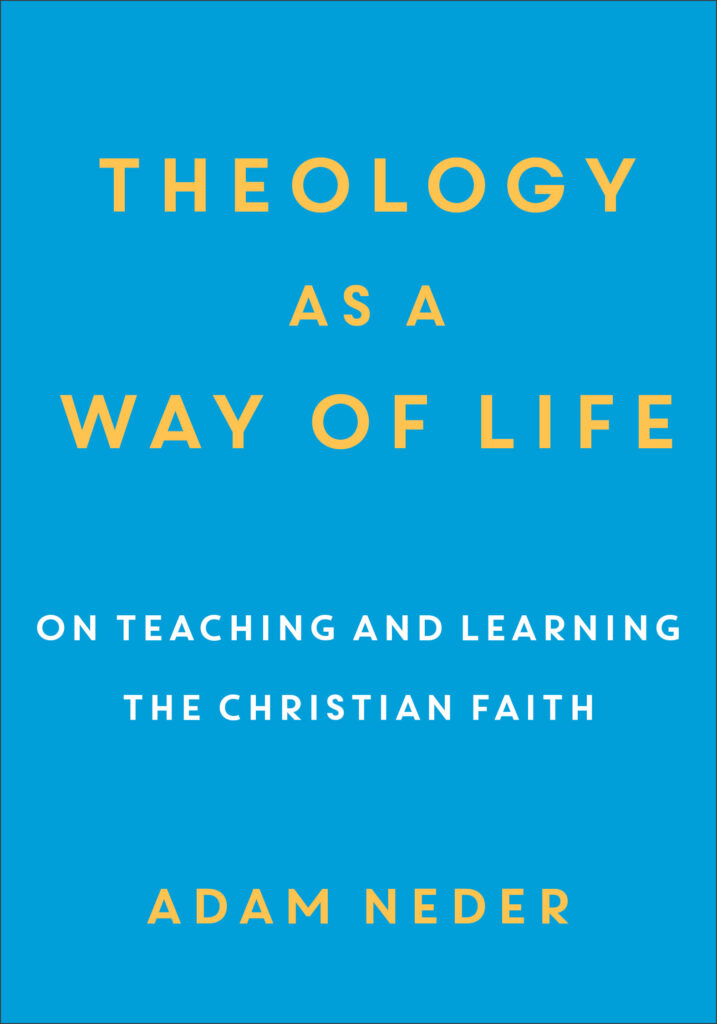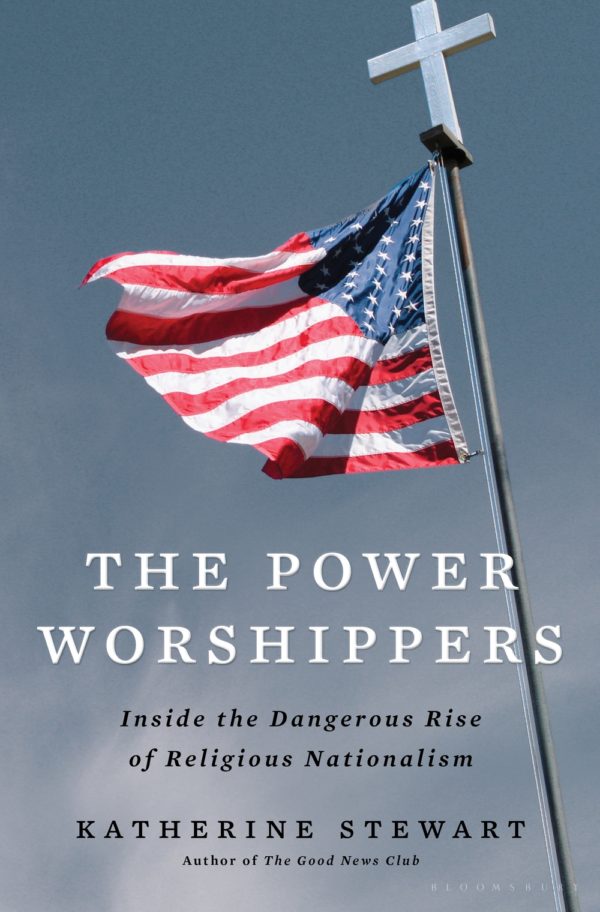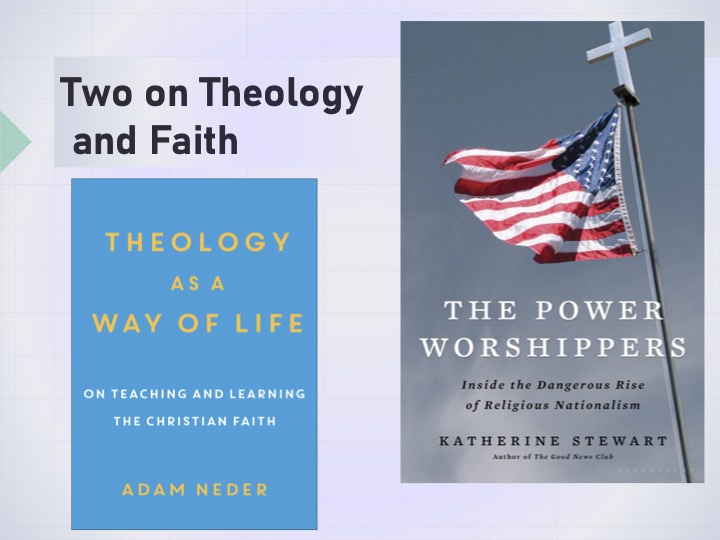While I don’t review all that I read, I’m way behind in writing reviews of books I planned to review. Here’s an attempt to catch up a bit on what I have been reading in the religious and theology realm.
Adam Neder, Theology as a Way of Life: On Teaching and Learning the Christian Faith

(Grand Rapids, MI: Baker Academic, 2019), 158 pages.
This is a small and somewhat simple book with profound insights into the teaching profession. While Neder is a professor, much of what he says in this book can be applicable to all levels of teaching (especially teaching the Christian faith). This book grew out a lecture the author gave at a Karl Barth symposium on Barth’s Evangelical Theology. Neder shifted focus from Barth’s thoughts on writing to teaching. In addition to Barth, he draws heavily on Dietrich Bonhoeffer and Soren Kierkegaard and the Scriptures. He also draws on his own experience in the classroom and acknowledges the lessons (sometimes hard lessons) he has learned.
Each chapter focuses on a different theme that together helps create a portrait of one who might teach Christian thought. The first theme is “identity.” Our identity must be bound in Christ, who reconciles us to God. Everyone, the teacher and student, must make a decision as to whether or not the accept Jesus Christ. Furthermore, the teacher needs to understand his or her inability to teach faith. That can only come from the Holy Spirit.
The second chapter examines “knowledge.” The author begins by noting that some of his best students of theology were not Christian. In an academic setting the teacher can only evaluate academic work. However, as the case was made in the first chapter, knowledge doesn’t save us. It’s our willingness to trust and follow Jesus. As Kierkegaard insisted, “the Christian life cannot be “reduced to thinking the right thoughts about God.” The teacher has to help the student develop his or her own thoughts about God, which is risky as the teacher cannot control the outcome. Neder also examines objections to such knowledge such as the idea that God is unknowable. While that it true we can’t know God with our own efforts, we must remember that Jesus reveals God to us.
The third area of exploration is ethos. Christian teachers need to be humble for we are witnessing to a larger truth. While Barth lays out such ideas in Evangelical Theology, Neder acknowledges that he, too, fell short. It’s easy for us to think higher of ourselves that we should. We need to be humble and to realize that we’re always teaching, not just when we are behind the podium. Can God’s truth be seen in our lives? How can we, as a teacher, remain connected to the truth? Can we become less so that someone else become greater?
Danger is the subject of the fourth chapter. Our theology takes place in an encounter with a living God, which means we’re moving out from our comfort zones and walking a precarious path. Using the story of Nicodemus (John 3), Neder demonstrates how we can’t follow Jesus from a safe distance. Christianity is more than knowledge and doctrine. While that might think we can maintain a safe course, faith demands otherwise.
Neder’s final chapter is titled “Conversation.” Here the conversation is between us and God (and God’s word). Barth describes this as “primary conversation.” But we also need what Barth called secondary conversation, that between the student and other students (past and present). We learn from others, not just from the living, but also from those who preceded us. That’s why we study their written records, but it’s all in service to the primary conversation. their attempts at understanding God. Neder encourages his students to read widely and outside their tradition, to gain appreciation of and to maintain a healthy skepticism of their own traditions. Learning from a broad perspectives reminds us that in this imperfect world, we can always improve ourselves.
Neder then goes into detail about having such conversations in the classrooms. He encourages the teacher not to answer their own questions and to engage the students to help them arrive at the answers. It is also important for the teacher to understand the student’s questions. Failure to do so will cause a student to shut down.
There is much to commend in this book for teaching, but especially for the Christian teacher.
Some quotes:
Grace is not opposed to working but to earning and self-reliance. (30)
Jesus wants followers, not admirers. (41)
Christians do not only receive from him (Jesus Christ), they also partner with him in the work he is doing in the world. (72)
Conversations with Jesus rarely unfold according to plan. Jesus continually shocks and astonishes people, rattles their cages, upends their expectations, eludes their traps, and zeroes in on their deepest motivations.” (96)
“Jesus is the most hazardous of all hazards.” -Barth in his Epistles to the Romans commentary (99)
“[W]e tend to talk about God as if he is not present. Few things are harder than remembering that God is alive and active in our classrooms, few things easier than teaching as if he is not.” (101)
“The pressure to sell Christianity at discount prices is intense, and Christian leaders who refuse to adjust to these conditions create very real problems for themselves.” (111-I would add, and for others.)
“Our aim is to lead students more deeply into the subject matter to which Scripture bears witness, and we cannot do that apart from the history of Christian reflection on Scripture.” (121).
“We read because we are not yet who we want to be, because our knowledge and our lives are not yet what we think they could or should be.” (128)
Katherine Stewart, The Power Worshippers: Inside the Dangerous Rise of Religious Nationalism

(2019, New York: Bloomsbury Publishing 2022), 342 pages including notes and index.
Katherine Stewart focuses her journalistic lens into the rise of religious nationalism within the United States. Following the money along with individuals who seem ubiquitously present (but always in the background such as David Barton, Tony Perkins, Peter Wagner, and R. J. Rushdoony), she shows how the movement is more than a cultural crusade against perceived social ills such as abortion or the LBGTQ community. Instead, she suggests the movement is about power. The movement isn’t necessarily conservative (as in maintaining the status quo), but radical at its core. One of its goals is to undo the democratic processes and grab power. As one founder noted, if they could just get support of 10% of the county, they could control the change. Along with being political, the movement seeks to mobilize churches to achieve their goals of creating a society based on their vision of a biblical worldview.
Stewart acknowledges the best resistance to the Christian Nationalism will probably come from other Christians. However, she only focuses on the movement itself. While she is honest about this from the beginning, her reporting left me feeling hopeless against such an onslaught.
In each chapter of the book, Stewart follows a particular organization or idea within the larger movement. She begins with a gathering of religious leaders in the Carolinas at Unionville Baptist Church just before the mid-term elections in 2018. The gathering was a forum for Tony Perkins, of the Family Research Council, to reach pastors to help them organize voters. While he didn’t mention the Republican party, everyone present knew he was promoting their candidates. Much of the danger of the Christian nationalist movement is they use politicians, preachers, and key moral arguments to consolidate power.
As has many others before her have pointed out such as Kristin DeMez in Jesus and John Wayne, Protestant Churches haven’t always been against abortion. Even in the early 70s, the Southern Baptist Convention supported abortion rights. Ronald Reagan as governor signed the most liberal abortion law to date. The big issue for many pastors of large conservative churches (such as Jerry Falwell and Bob Jones) was how to maintain tax exempt status of their segregated schools. Into this discussion came Paul Weyrich. He was a former Catholic (who’d joined a Melkite Greek Catholic Church after Vatican II). Weyrich saw an opportunity to help conservative causes as they made abortion a political issue hidden within a religious framework. This decision helped the conservative movement “Get Religion.” In the 60s and 70s, the liberals appeared to have religion on their side. This was especially so during the Civil Rights movement.
In other chapters, Stewart examines how Christian Nationalist attempt to rewrite history. Some within this movement draw deeply from historic teachings from the likes of Robert Lewis Dabney. He was a Southern theologian and an apologist for slavery before and during the Civil War. However, it’s wrong to think of the movement as only white as she explored those of other races within it. She looks at how others in the movement have developed massive data bases to help conservative pastors to get out the vote. Not surprisingly, home schooling is a big issue for many, as well as helping church sponsored schools.
Writing a few years before the reversal of Roe vs. Wade, she explores the movements attempt at remaking the nation’s courts. In addition to abortion, she also looks at how the movement, especially within Roman Catholic hospitals, who often limit medical care that’s provided. In the final chapter, she looks at the global movement and the draw to authoritarian leadership in other countries (including Russia) for those who identity with Christian Nationalism. While she shows the international reach of Christian Nationalism, I would recommend the reader check out Ann Applebaum’s The Twilight of Democracy.
We live in a fast-changing world. As a result, some of this book is out-of-date after less than five years. After all, after January 6, we have some Americans being willing to undermine democracy openly. Furthermore, the Supreme Court has overturned Roe vs. Wade thanks to the packing of the court with those who had that as a primary focus. And Russia has shown its hand in its invasion of Ukraine, claiming partly their goal is to save Christianity. This study provides the background for how this came about. It will be up to us to heed Stewart’s warnings. If not, the book might become prophetic. It’s my hope, by pointing out the goals of Christian Nationalists, this book can be an antidote to bringing about a world view that seems out-of-step with that rabbi from Galilee.
I recommend reading this book. Even more than that, I encourage those who see the danger of Christian Nationalism and strive to follow Jesus to consider how we can confront this attack on American Democracy. The abortion debate is one area that I find particularly disheartening. How can we discourage and reduce abortion on demand, which I feel should be the goal, while removing it from arena of politics? But if it has political advantages for some, I’m afraid it will continue to divide people and make our society even more unstable. Christian Nationalists have their own world view. Christians who strive to be faithful to their Savior need to articulate a world view that’s faithful to Scripture and Jesus Christ.



Andy Stanley’s “Not In It to Win It” makes some of the points you describe in The Power Worshippers, although Andy is, of course, a pastor and theologian. Christian nationalism is dangerous, in my opinion, and runs counter to Christ’s teaching, e.g. love your neighbor, turn the other cheek.
“Not In It to Win It” is a good read. I reviewed it last year, I think.
Thanks for the reviews, Jeff.
Christian Nationalists are a little frightening. Some of their latest thoughts are troubling as they are more concerned with the afterlife and not this life so important matters like climate change are not a big deal to them.
I agree that CN is frightening. And those who think we can do anything to this earth because it’s all going to be destroyed don’t understand Genesis 1.
While we read different kinds of books I like seeing what everyone else is reading too. Thanks for letting us know what you thought of these.
I also enjoy reading the reviews of others. There are so many books, so little time!
I feel like I should read The Power of Worshippers. However, the more time passes since I read Jesus and John Wayne, the more I’ve realized how much it affected me. I’m not sure I need to add to that!
There’s a difference between “Power Worshippers” and “Jesus and John Wayne.” Stewart is a journalist and her writing/research is as such. She is looking at a much smaller slice of the religious spectrum, basically the idea of creating a Christian state. DeMuz is a historian and theologian and writes about how the masculine ideal has hijacked evangelical Christianity. While there is overlap, both books are informative.
It’s always interesting to read your reviews and discover new books. Thanks, Jeff.
Thanks for reading, Lee.
Interesting books. The first, I think I’d enjoy, the second seems more politics than people. “Christian Nationalism”–I’m Christian and I love my country. I guess she’s talking about me. Sigh. Thank you for the excellent review. Now I can say (if I need to) that I’m aware of this author’s opinions.
Christian nationalism is more than just being a Christian and patriotic. While there are different forms of Christian Nationalism, it wants to create a nation that in it’s mind is Biblical and has little usage for others. Some but not all, in this movement want to re-establish our nation based on Old Testament law. Stewart is a journalist, not a theologian.
I wonder if a helpful way to explain how they envision the world would be to compare them to strict Islamic Countries that have a tiered society where those who were “People of the Book” (Jews, Christians, other monotheists) have a second class status and are subjected to more taxes, etc, but whose status was above those who practice polytheism. I’ve not seen this analogy used, but it seems to capture what I think some within the Christian Nationalist movement would envision.
Yes, I am a Christian and a patriot, but not a Christian Nationalist. Nor do I see support from such ideas in the teachings of Jesus.
Good clarification. Thanks, Jeff.
Russell Moore in his newsletter today has some interesting thoughts on Christian Nationalism and why he doesn’t think it is Christian: https://christianitytoday.activehosted.com/index.php?action=social&chash=c43aa697165c1f99d53d37d5d279f9a3.13394&s=5b430edcb994194ee3ff2cdddf5d6fd7